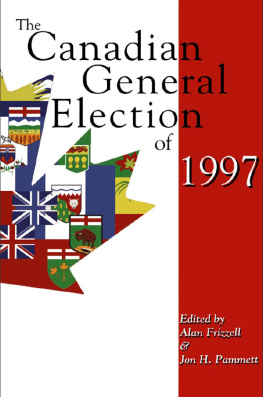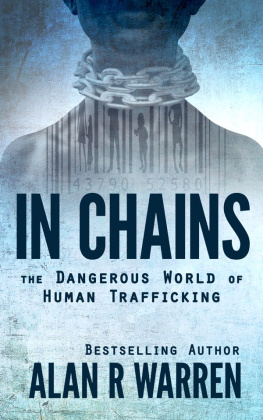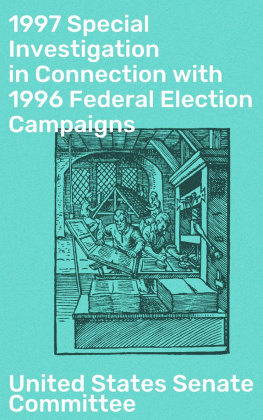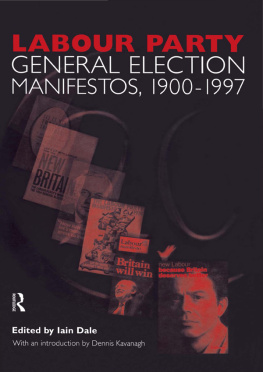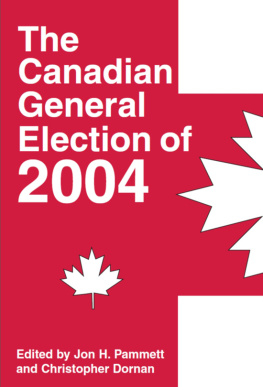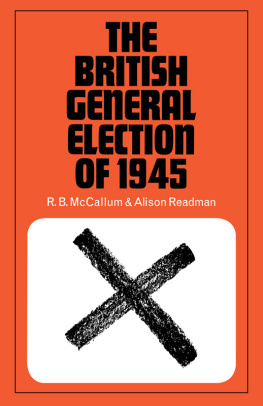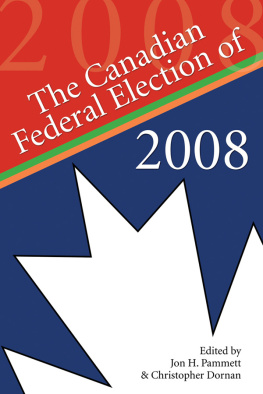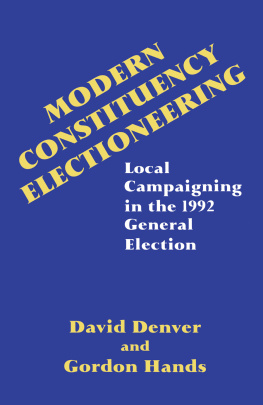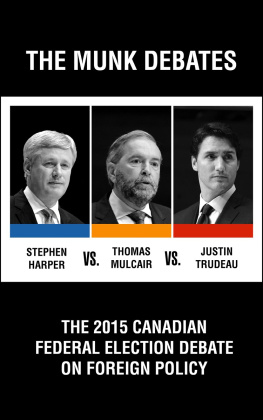This compilation copyright 1997 by Alan Frizzell and Jon H. Pammett Copyright for each essay remains with its author.
All rights reserved. No part of this publication may be reproduced, stored in a retrieval system, or transmitted in any form or by any means, electronic, mechanical, photocopying, recording, or otherwise (except for brief passages for purposes of review) without the prior permission of Dundurn Press Limited. Permission to photocopy should be requested from the Canadian Reprography Collective.
Designer: Scott Reid
Printer: Webcom Limited
Canadian Cataloguing in Publication Data
The Canadian general election of 1997
ISBN 1-55002-300-4
1. Canada. Parliament Elections, 1997. I. Frizzell,
Alan, 1947.II. Pammett, Jon H., 1944.
FC635.C366 1997324.9710648C97-931775-4
F1034.2.C366 1997
123450100999897
We acknowledge the support of the Canada Council for the Arts for our publishing program. We also acknowledge the support of the Ontario Arts Council and the Book Publishing Industry Development Program of the Department of Canadian Heritage.
Care has been taken to trace the ownership of copyright material used in this book. The author and the publisher welcome any information enabling them to rectify any references or credit in subsequent editions.
Printed and bound in Canada.

Printed on recycled paper.
Dundurn Press
8 Market Street
Suite 200
Toronto, Ontario, Canada
M5E 1M6
Dundurn Press
73 Lime Walk
Headington, Oxford
England
OX3 7AD
Dundurn Press
250 Sonwil Drive
Buffalo, NY
U.S.A. 14225
Introduction
It was the best of times, it was the worst of times, it was the age of wisdom, it was the age of foolishness, it was the epoch of belief, it was the epoch of incredulity, it was the season of Light, it was the season of Darkness, it was the spring of hope, it was the winter of despair.
The familiar lines from Charles Dickens appear to sum up the situation for all of the Canadian political parties in the general election of June 2, 1997. They won some, but they lost some. They accomplished some of their objectives, but fell short in others.
The Liberal Party of Canada had returned to power in 1993 after a decade on the opposition benches. They had won a solid majority of 29 seats in the House of Commons, and had been relatively unscathed by subsequent attacks from a divided and scattered opposition. The ineffectiveness of all the opposition parties led to the general expectation that the Liberals would win a 1997 election handily, almost by default. They had received substantial (if at times grudging) praise for their performance in government and their ability to cut spending and reduce the deficit. They were the only party with credible claims to be a national party, supported in all areas of the country. The only question remaining about an election triumph for them was when?
The Liberal Partys own answer to this question turned out to be sooner rather than later. Whether because the partys strategists were apprehensive about the potential situation later in the year, or just anxious to get the inevitable over with, they opted for a June election, only three-and-one-half years after their 1993 victory. Despite their eagerness for the election, however, the Liberals appeared disorganized. They mounted a shaky campaign which was light on specific issues and weak in leadership, and almost parleyed their majority government status into a minority, something most observers at the outset of the campaign thought was almost impossible.
All of the other parties could point to successful aspects of their campaigns. The New Democratic Party was able to make gains by improving their appeal to women and to the disadvantaged Atlantic region of the country. They did this through establishing their campaign issues of the need for government job creation, and the imperative of saving social programs from further budget cutting. The Progressive Conservative Party established their leader, Jean Charest, as the most popular federal leader in the country, and staked out a moderate position on the national unity/Quebec issue by championing distinct society status for that province. The Reform Party consolidated their Western base of support by branching out from their usual emphasis on economic issues like deficit reduction and tax cuts, and established themselves as the hard-line voice of English Canada toward Quebec separatism. The Bloc Qubcois reinforced their status as the voice of Quebec in Ottawa and held on to the bulk of their support.
But just as all parties could claim some successes, all had prominent failures in their campaigns. The New Democratic Party failed to make any headway in recovering a presence in Ontario, lost ground in the West to Reform, and generally had a difficult time persuading voters they were major players in the political game nationwide. The Conservatives, despite a brief surge as a result of the victory of Jean Charest in the leaders debates, did not establish themselves as the national opposition they desperately wanted to become; their seats are concentrated in the Eastern part of the country. Likewise, Reform failed to become a national party, marginalizing itself in Ontario by its anti-Quebec message. The Bloc Qubcois lost seats and votes, and fell out of Official Opposition status in the House of Commons.
In some ways, the 1997 election was a logical extension of the results of the 1993 election. That event had left the Liberals as the dominant national party, with representation from all parts of the country and a substantial majority in Parliament. The Bloc Qubcois and the Reform Party formed regionally-based opposition groupings, which competed for the right to form the Official Opposition in Parliament. The other two parties, the New Democratic Party and the Progressive Conservatives, fared very badly in terms of legislative seats in 1993. The 1997 result, which saw those two parties compete to secure the representation rights to the Atlantic Region, seemed to fill in the main gap. Ontario, the large central region of the country, was the stronghold of the Liberal Party. Though the Liberals resisted attempts to brand them as a regional party as well, the numbers in 1997 began to look more and more like it.
As seems inevitable in any Canadian election in which regional appeals come heavily into play, the first-past-the-post electoral system came under scrutiny after the result was known. The Liberals won the 1997 election by getting only 38% of the vote nationwide, an all-time low for a majority government. In three previous elections, the Liberals had formed majority governments with 41% of the national vote. The first of these instances was in 1921, when the Progressives entered federal politics, capturing almost one-quarter of the vote. The second was in 1945, when the CCF emerged onto the national scene and cut into the vote totals for the two traditional parties. The third was in 1993.


 Printed on recycled paper.
Printed on recycled paper.
